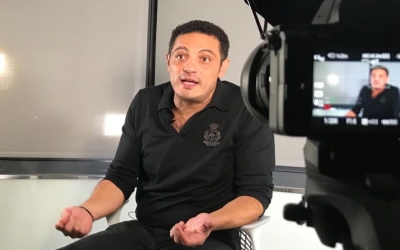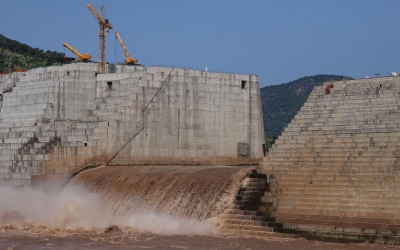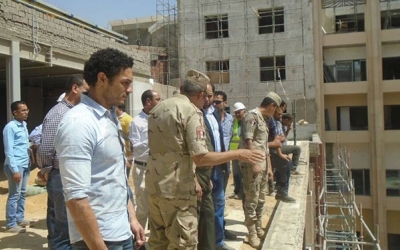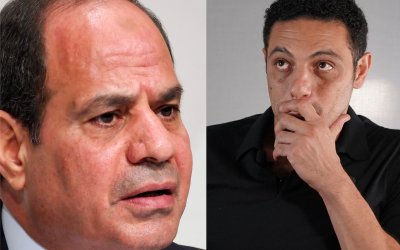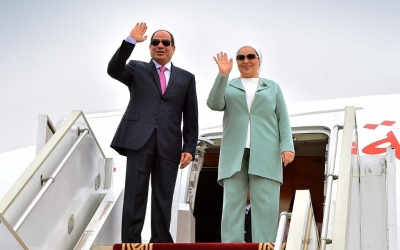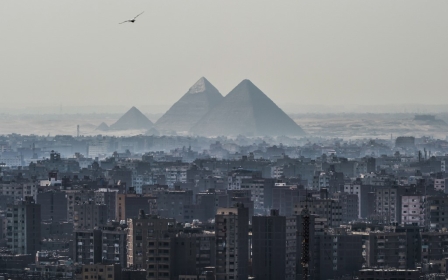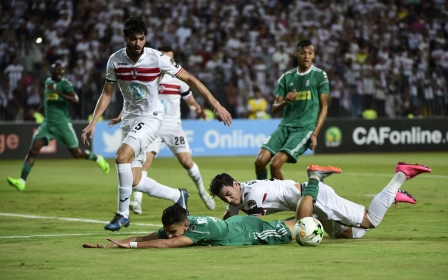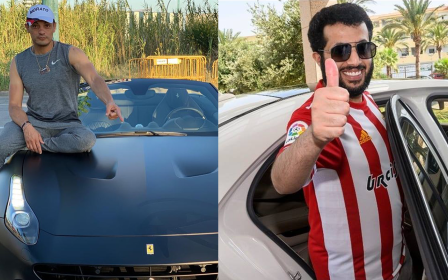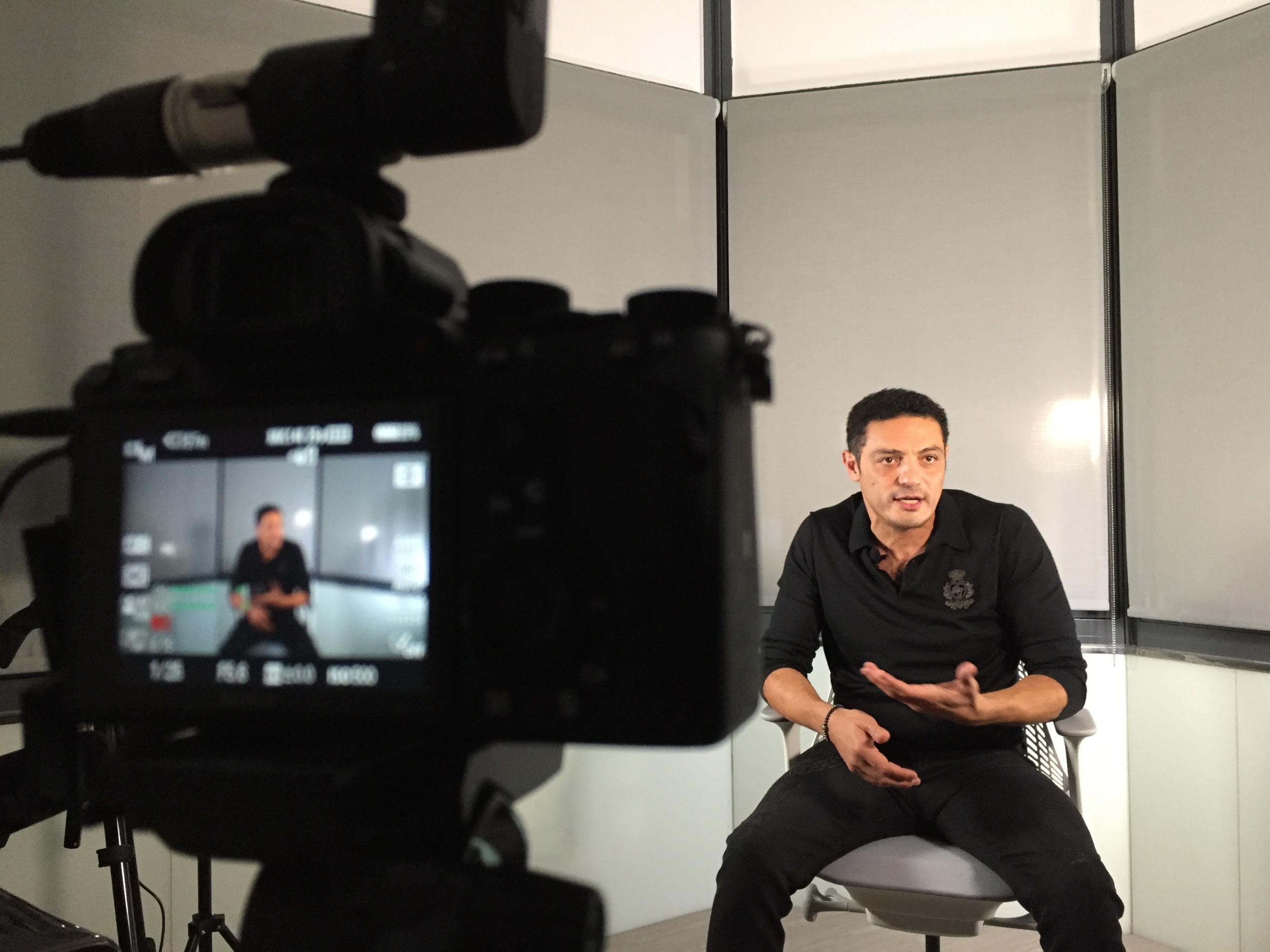
Mohamed Ali: Face-to-face with Egypt's most-wanted man
The meeting was at 8pm, in a secret location somewhere in Spain. We had little else to go on. Overnight, we booked flights, then carried camera equipment to a foreign country, with a vague promise that in a few hours time we would be sitting in front of the most wanted man in Egypt.
Except he wasn't in Egypt. He was somewhere in Spain. In exile, with nothing but hotel wifi and an axe to grind with the head of the military he once worked for.
For nearly two months, Mohamed Ali had been masterminding a campaign to undermine Egypt's President Abdel Fattah el-Sisi, whose initial popularity had waned after years of crippling austerity measures, hyperinflation and unemployment.
At first, Ali seemed focused on retaining complete editorial control over his own message, speaking directly to Egyptians and Sisi without an intermediary, and often through live and unedited video.
New MEE newsletter: Jerusalem Dispatch
Sign up to get the latest insights and analysis on Israel-Palestine, alongside Turkey Unpacked and other MEE newsletters
His messages became the talk of Egypt, last month sparking the first major protests against Sisi in years, and international and local media have sought face-to-face contact for weeks without success.
Now he is changing tactic, reaching out to international media to globalise his message - and maybe just protect himself against the Egyptian authorities that seek to silence him.
An hour before the interview time, we were sent a location.
We met two of his friends at an unceremonious bar on the side of the road, and, in classic Egyptian hospitality, one of them carried a plastic bag full of water bottles, crisp packets and Coca-Cola cans. It was only missing sunflower seeds.
Soon Mohamed Ali walked in from around the corner, a grin draped across his face, his towering build athletic and at ease. His height, and his wild Egyptian curls, made him impossible to miss - which wasn't an asset for a man in hiding.
No wonder, then, that "ozaa", or "dwarf," is Ali's favourite insult for his nemesis Sisi, a leader of diminutive stature. One could picture him looming over Sisi and his wife as they walked around the palaces he was asked to build for them.
Instead of immediately departing to our interview destination, he insisted we sit down for a drink, and immediately ordered a vodka tonic - with the vodka and the tonic to be brought separately.
Either he was loosening himself up for the first interview he'd done since becoming a dissident in hiding, or making a point that the portrait his state-sponsored critics had painted of him as a "drunken fool" didn't bother him.
One of his friends translated his request into Spanish for the waitress. Ali's year in exile clearly hadn't come with an intensive language course, and he admitted that his humble education hadn't afforded him a good grasp of English or other languages.
In person Ali is more captivating than behind a phone screen, cracking crude jokes and slapping his palms together animatedly through the haze of his signature Marlboro Red cigarettes that were never far from his fingers.
Over casual conversation, he dips in and out of long speeches about Sisi and the military establishment.
"They've been in power since 1952. They're like the Saudi royal family, they own the country. They're a military that has its own country, not the other way around."
At full throttle, with his voice rising in parts for effect, he resembled the millions of Egyptians who talk about the inner workings of politics like they were sitting in closed meeting rooms with generals.
Except Mohamed Ali was actually at those meetings, and he had so much to say.
Meeting the military
The first thing on his mind as he sat down for his first interview since becoming an international fugitive was how familiar the burning lights and long set-up times were to his time as an actor in Egyptian cinema.
It was a brief stint, far removed from the dirt-scapes of the construction industry where he made his millions as a contractor for the army, though his beginnings couldn't have predicted either reality.
Mohamed Ali began working in his father's gold store when he was 15. When he was 17, he quit and went in search of his own fortune.
"I must have worked maybe 13 different jobs, many in quick succession. I was good at some, and failed at others."
With a diploma in hand, he entered the contracting industry with the telecommunications giant Etisalat. From there, he would find his doorway into the lucrative world of the military's property empire.
"In order to work in the army, you have to know an officer who is well connected, and who takes you on as a partner. My partner was the son of a general, and that opened all the doors for me.
"One of the problems I had early on is that I never went into the army. I avoided it. I mean, I'd been working to help support my parents and my siblings since I was 15, so why would I waste my time in the army?"
So until then, Ali had actively avoided the military. All male Egyptians are required to perform military service in their early 20s, but many, like Ali, are able to evade conscription.
Ali said his low grades and lack of a formal degree would have likely got him stuck in a low-rank army position for several years. He also had "a bit of a temper" as a young man, and thinks that if he had ever found himself in an argument with a higher-ranking officer, he would have been slapped with a five-year extension of his service.
"So when I started working with them, I was very cautious of the whole military service issue, and I didn't want to cause any trouble."
The only time Ali become agitated during the interview was on the suggestion that perhaps he should apologise to the Egyptian people for the years he'd spent embroiled in the very corruption he now railed against.
'I would never apologise to the Egyptians. I've sacrificed for them'
"I would never apologise to the Egyptians. I've sacrificed for them. When I entered the army, how old was I? I was 30 years old. How can a 30-year-old understand what corruption is, and that it's rife within the army? How am I supposed to understand this?"
Ali said he was raised on the notion that the Egyptian military was one of the most important institutions in the country, and a symbol of respectability. Working on its projects was a badge of honour for him and his growing company.
"It's only when I started working there that I began to realise the extent of the corruption, and not in the first year either."
During the era of president Hosni Mubarak, Ali remained on the periphery, a small contractor, but growing his influence and trust within army circles. By the time Abdel Fattah el-Sisi became defence minister in 2012, he found himself being drawn in to a new circle, one that would, a year later, seize total control of the country.
His first interaction with what he describes as "the top of the pyramid" was when he received a call from a general telling him he immediately needed to begin construction on a villa for Sisi and his family. It was to be a welcome gift for the man who had just taken over as head of the military.
The call was all that needed to be made. There were no contracts written up for military projects. Most dealings with contractors were done verbally, and the expectation was that construction would begin immediately - even before plans had been drawn up or research done.
A few days into construction, Sisi, his wife Intisar and his sons began visiting the site of their new home, pouring over every detail. It would be the first of many personal projects Ali would build for the man he would grow to despise, but who would bring him untold levels of wealth in the process.
It would also expose him to the inner workings of Sisi and his most trusted companions, and the secrets he would one day share with the world.
"I would hear the smaller officers talking about Sisi, saying: 'Watch, this man is going to become the president, the moves are already being made'."
That year, Ali also decided he needed to get out.
Traitor. Spy. Puppet. Thief
Ali's detractors - of which Egypt's military-controlled media continue to be the most vocal - have accused him of an array of contradicting charges.
They said he's a traitor. A spy. A Muslim Brotherhood puppet. A disgruntled thief who made away with millions. A homosexual. An alcoholic who frequented clubs and spent his time with beautiful women.
The latter may be a myth of his own making, a Bruce Wayne-like cover he said he crafted to help him fade into the military's blind spot while he plotted his escape.
"They keep accusing me of being a womaniser, but where are they getting these pictures from? Aren't they from my own Facebook page? Am I not the one who uploaded them?"
In his final years working under Kamel el-Wazir, then head of the army's engineering authority and a Sisi confidant, Ali stopped coming in to work, or frequently showed up late.
He made excuses about being tired or hungover. He told those around him he wanted to focus on his acting career more, that contracting no longer interested him and he wanted to tie up his existing projects so he could dedicate himself to the screen.
For those few years, Ali seemed to be channelling his frustrations into his films. He initially played a number of police officers in movies and television dramas, before focusing on a large passion project - a 27m Egyptian pound ($1.6m) film called The Other Land which he financed and also starred in.
The film told the story of a poverty-stricken village on the northern coast of Egypt, and the families from the village who decide to cross the Mediterranean Sea to seek refuge in Italy. It was released just two months after the September 2016 Rasheed boat disaster, in which 300 Egyptians drowned when their boat capsized.
Many of the film's key scenes were shot in Spain.
During that period, Ali found out one of his employees had secretly recorded audio of him mocking Sisi and other generals during a work meeting and that the tapes had found their way to Wazir. By this point, he couldn't salvage his relationship with the army even if he wanted to.
And so, in 2018, he sold his house and bought property in Spain, applying for residency and moving some of his money abroad. A year later, when his children finished the school term in August, he got them out of the country too, and away from the havoc he was about to unleash.
Unlikely leader
Just days after he was sure his children were safe, on 2 September, Mohamed Ali sat in a hotel room overlooking the Mediterranean. He opened his phone camera, started a live video on his public page, and began to spill his secrets.
In less than two months, Ali became an unlikely leader of a new revolt. He was a millionaire who spoke about working-class hardships. An army insider who railed against the military's grip on power.
While he insists on having no connection to any opposition group or figure, his recent success in galvanising people around him attracted the attention of many of them - and politicians and activists have been in touch, helping him put together a plan for how to proceed with his campaign to unseat Sisi.
'The opposition is all now unified. And all of them, with the grace of God, are with me. Leftists, secularists, Muslim Brotherhood, liberals'
"The opposition is all now unified. I can announce that now. And all of them, with the grace of God, are with me. Leftists, secularists, Muslim Brotherhood, liberals, all of them are now with me," Ali said.
"That's what’s scaring [Sisi], that I have the opposition with me, and a large majority of the Egyptian people. All that remains is the army and the police. They've refused to stand with us. They've betrayed us."
The state, and by its extension the state media, pushed the narrative that he was part of the Muslim Brotherhood. Since Sisi toppled Mohamed Morsi in a 2013 military coup, the group the removed president hailed from has been outlawed.
But Ali told Middle East Eye in no uncertain terms he had been on his own from the very beginning, and that the rumours of a powerful "secret cell" operating from behind the scenes was ridiculous.
For many weeks, who or what was driving Ali was a question on everyone's minds. Opposition groups were certain he was being funded by a faction in the army disgruntled with Sisi, and looking to remove him.
"Cell? What cell? I only have my two friends behind me," he laughed, and shot a quick glance at the pair in question, who stood on the other side of the cameras grinning.
Even away from the camera, Ali had an infectious energy about him. He was charming in a way that seems genuine, confident while retaining politeness, and foul-mouthed in a way that came across as mischievous instead of crude.
It was an everyday charm that no doubt made him popular among both the construction workers he employed and the generals that employed him. It could explain why ordinary Egyptians were drawn to him in a way no liberal or Islamist figure had managed in the last six years.
"What comes straight from your heart will reach people's hearts. If you lie to people, they may believe you at first, but eventually they'll see through it."
Trapped
But behind the veneer of European comfort, an unspecified fortune and sports cars sat a quiet resignation about his current situation.
The reality is that Ali cannot enjoy the Spain he has often praised in his videos. He is trapped in it, unable to return home or even venture too far in the daylight without the thought that Sisi's men are hot on his tail.
"I'm imprisoned. I plan my movements very carefully. There's a lot of places I can't set foot in. Obviously, my fight isn't with an ordinary person. My fight is with a dictator... someone who is obsessed with retaining power. So clearly it's in his interest that I disappear."
Mohamed Ali doesn't like talking about his relatives still living in Egypt. His father, who broke down on national television just days after the first video was released, said Ali had "destroyed and humiliated" the family and was ungrateful for everything the military had given him.
His younger brother and his ex-wife reportedly still work for the company he built and remain involved in construction projects with generals. When pressed, Ali simply said "they're upset at me" and went quiet.
Ali's videos in recent days have taken on a more muted tone. The fire with which he had spurred the first significant protests since 2013 - speaking in grand gestures about the power of one-hour demonstrations, the factions within the military that were ready to move, and Sisi's impending removal - now seems to have waned.
For many in Egypt, the promise of another mass street movement to uproot Sisi like it had Mubarak was crushed on 27 September, when would-be demonstrators woke to find all major cities under complete lockdown.
With more than 2,000 detained and police checkpoints searching through mobile phones for political content, many people were afraid to leave their homes even to buy groceries, let alone openly defy the president. Apart from a handful of provincial demonstrations that were quickly stamped out by authorities, the streets of Cairo, Alexandria and Suez were deserted.
That day, Ali released a video in which he bordered on hysteria, telling people: "I beg of you, just go out onto the streets." It was the first sign that the man who always seemed one move ahead of Sisi had overplayed his hand.
'From the very first video I published, it was over for me'
Now he tells his followers they should be patient, that the military has been in power since 1952 and can't be expected to bow out in just a month.
He tells them it's the beginning of a long journey that ends definitively with Sisi out of power.
But the certainty that rang in his voice before is no longer there, and he acknowledges that his public accusations have put his future, even his life, on the line.
"From the very first video I published, it was over for me," he told Middle East Eye.
"I'm not going to lie to you. I started this game with him, and now I can't work. All of my assets have been frozen.
"He is trying to terrorise me… I know he's trying to kill me."
Middle East Eye delivers independent and unrivalled coverage and analysis of the Middle East, North Africa and beyond. To learn more about republishing this content and the associated fees, please fill out this form. More about MEE can be found here.


